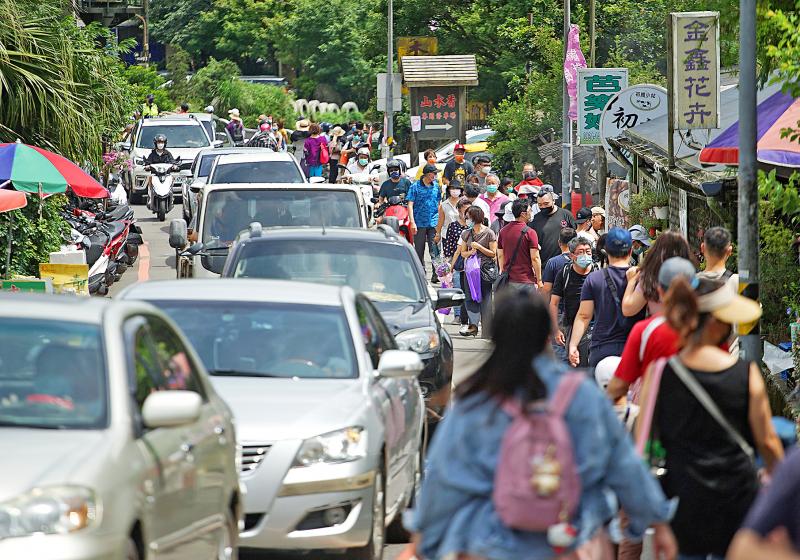The Directorate-General of Personnel Administration yesterday published the list of public holidays to be observed by government agencies next year, including a 10-day Lunar New Year holiday and six long weekends lasting three days or longer.
Civil servants would get a total of 116 days off next year, including public holidays, and all Saturdays and Sundays except for six weekend days scheduled as make-up work days, the list shows.
While the list of holidays is issued for government agencies and state-run entities, it is also commonly observed by the private sector, including banks and most companies, as well as schools.

Photo: CNA
The first long weekend of the year is Dec. 31 this year to Jan. 2 next year, to celebrate the founding of the Republic of China on Jan. 1, which falls on a Sunday next year.
It is followed by a 10-day holiday for the Lunar New Year from Jan. 20 to Jan. 29.
Other long weekends in the first half of next year include the Peace Memorial Day holiday, Feb. 25 to 28; the Tomb Sweeping Day/Children’s Day holiday, April 1 to 5; and the Dragon Boat Festival from June 22 to 25.
The public holidays in the second half of the year are the Mid-Autumn Festival, from Sept. 29 to Oct. 1, and the Double Ten National Day holiday, from Oct. 7 to 10.
The list does not include Workers’ Day on May 1, when workers can get a day off under the Labor Standards Act (勞動基準法), or Armed Forces Day on Sept. 3 for military personnel.
In Taiwan, when a public holiday falls on a Tuesday or a Thursday, the government turns it into an extended holiday weekend, and in return designates another Saturday as a make-up work day.
Make-up work days are Jan. 7, Feb. 4, Feb. 18, March 25, June 17 and Sept. 23 next year.

A drunk woman was sexually assaulted inside a crowded concourse of Taipei Railway Station on Thursday last week before a foreign tourist notified police, leading to calls for better education on bystander intervention and review of security infrastructure. The man, surnamed Chiu (邱), was taken into custody on charges of sexual assault, taking advantage of the woman’s condition and public indecency. Police discovered that Chiu was a fugitive with prior convictions for vehicle theft. He has been taken into custody and is to complete his unserved six-month sentence, police said. On Thursday last week, Chiu was seen wearing a white

The Taoyuan Flight Attendants’ Union yesterday vowed to protest at the EVA Air Marathon on Sunday next week should EVA Airway Corp’s management continue to ignore the union’s petition to change rules on employees’ leave of absence system, after a flight attendant reportedly died after working on a long-haul flight while ill. The case has generated public discussion over whether taking personal or sick leave should affect a worker’s performance review. Several union members yesterday protested at the Legislative Yuan, holding white flowers and placards, while shouting: “Life is priceless; requesting leave is not a crime.” “The union is scheduled to meet with

‘UNITED FRONT’ RHETORIC: China’s TAO also plans to hold weekly, instead of biweekly, news conferences because it wants to control the cross-strait discourse, an expert said China’s plan to expand its single-entry visa-on-arrival service to Taiwanese would be of limited interest to Taiwanese and is a feeble attempt by Chinese administrators to demonstrate that they are doing something, the Mainland Affairs Council said yesterday. China’s Taiwan Affairs Office (TAO) spokesman Chen Binhua (陳斌華) said the program aims to facilitate travel to China for Taiwanese compatriots, regardless of whether they are arriving via direct flights or are entering mainland China through Hong Kong, Macau or other countries, and they would be able to apply for a single-entry visa-on-arrival at all eligible entry points in China. The policy aims

COUNTERMEASURE: Taiwan was to implement controls for 47 tech products bound for South Africa after the latter downgraded and renamed Taipei’s ‘de facto’ offices The Ministry of Foreign Affairs is still reviewing a new agreement proposed by the South African government last month to regulate the status of reciprocal representative offices, Minister of Foreign Affairs Lin Chia-lung (林佳龍) said yesterday. Asked about the latest developments in a year-long controversy over Taiwan’s de facto representative office in South Africa, Lin during a legislative session said that the ministry was consulting with legal experts on the proposed new agreement. While the new proposal offers Taiwan greater flexibility, the ministry does not find it acceptable, Lin said without elaborating. The ministry is still open to resuming retaliatory measures against South